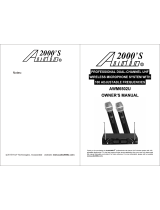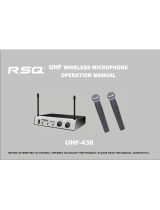
15
Nady Systems, Inc. warrants to the original consumer purchaser that the above unit is free from any
defects in material or workmanship for a period of one year from the date of original retail purchase.
If any such defect is discovered within the warranty period, Nady Systems, Inc. will repair or replace
the unit free of charge, subject to verication of the defect or malfunction upon return to Nady
Systems.
To the extent permitted by law, any applicable implied warranties, including warranties of
merchantability and tness are hereby limited to one year from the date of purchase. Consequential
or incidental damages resulting from a breach of any applicable express or implied warranties are
hereby excluded. This warranty is in lieu of all other agreements and warranties, general or special,
express or implied and no representative or person including a Nady dealer, agent, or employee
is authorized to assume for us any other liability in connection with the sale or use of this Nady
Systems’ product.
Whereas some states do not allow limitations on how long implied warranties last, and do not allow
exclusion of incidental or consequential damages, the above limitations and exclusions may not
apply to you. This warranty gives you specic legal rights and you may also have other rights which
may vary from state to state.
This warranty is subject to the following conditions:
1) This system must have been purchased from an authorized Nady dealer and all warranty
service must be performed by Nady’s service department. Any service not performed by Nady will
automatically void this warranty.
2) Items not covered: physical damage resulting from improper handling of the unit in transit from
the factory by the shipper (Nady Systems is not responsible for such damage and all such claims
must be made against the shipping company by the consignee.); defects caused by normal wear of
the product (expendable parts are typically connectors, cables, potentiometers, switches and similar
components); damage or defects caused by abuse, neglect, accident, failure to connect or operate
the unit in any way that does not comply with applicable technical or safety regulations, or improper
repair, excessive heat or humidity, alteration or unreasonable use of the unit, causing cracks, broken
cases/housings or parts; damage caused by leaking batteries; nish or appearance items; items
damaged in shipment en route to Nady Systems, Inc. for repair. The warranty is null and void if any
Nady serial number has been removed or defaced.
How To Obtain Service:
1) If factory service is required, you must contact our Service Department at (510) 652-2411 for
a return authorization (R/A) number. Make sure the R/A number is clearly marked on the outside
of your package. (Please note: if an R/A number is not included, our Shipping Department cannot
accept your package.)
2) Send the unit back to Nady Systems, Inc., 6701 Shellmound Street, Emeryville, CA, 94608,
freight pre-paid.You must include proof of date and place of purchase (i.e., photocopy of your bill of
sale) or Nady cannot be responsible for repair or replacement. Nady Systems, Inc. will not repair,
nor be held responsible, for any units returned without proper identication, return address, and RA
number clearly marked on the package.
3) Per the above, Nady will perform all warranty service and return the unit to you at no charge.
Nady Systems will inform the buyer if product sent in does not meet the terms of this warranty and
will provide a quote for xing the unit and/or shipping it back exclusively at the buyer’s expense.
ONE-YEAR LIMITED WARRANTY

















